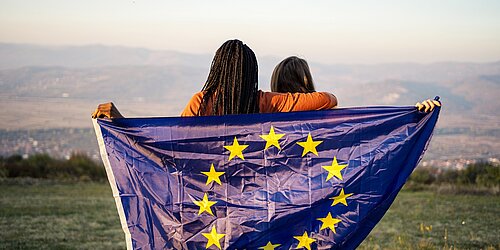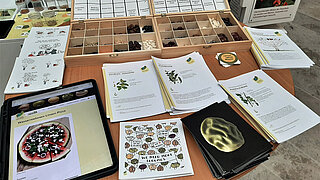Copyright: The Global Bean / Lisa Hoffmann
Project backround
The ongoing climate crisis and the growing depletion of natural resources pose a challenge to make choices that care for the planet. These include nutritional choices, because producing food is a key driver for climate change. More than 40 percent of the world’s ice-free land area is used for farming. In particular, protein-rich foods are central to the impact diets have on the planet. More and more people acknowledge that we need to reduce our consumption of animal-based proteins substantially in order to achieve climate change mitigation goals, ensure nutritional justice, protect global biodiversity, and improve human health. This is especially true for industrialized countries with traditionally high meat consumption.
Legumes are a very special diverse group of protein-rich plants that can help people eat better for the environment and for their health. They protect the climate because they are a natural source of fertilizer nitrogen, increase crop diversity, and support sustainable healthy diets. Despite this, legumes are rarely grown on European farms even though beans (including soya beans), pea and lupines grow as well in Europe as anywhere else. Instead, most European farmers who grow arable crops concentrate on growing cereals, such as wheat and maize. This is due to the already existing experience with (industrial) cereal farming on the one hand. And to maize, for example, playing a major role in livestock production both as feed and as a crop with a high uptake of nitrogen from manure on the other hand. European farmers also require large amounts of plant protein and land for livestock farming and production: About 60 percent of cereals grown in the European Union are fed to livestock and Europe is self-sufficient in most livestock products.
However, these cereals do not contain enough protein or the best quality protein. To compensate, the EU imports soya bean mostly from South America and thus - indirectly - contributes to the clearing of primary forests in those countries. This food system is not in balance and is not sustainable. Change is required.
Project goals and measures
The “Global Bean project” is an international exchange project that proposes an worldwide "do it yourself" approach, showcasing pulses as proven, sustainable and healthy sources of protein, soil improvers and representatives of global agrobiodiversity.
The project’s objective is to increase the general public’s appreciation for the multiple environmental and health benefits of legume cultivation and consumption, and to provide support and motivation to include legumes in consumption habits, gardening and education. It wants to promote legumes as excellent sources of protein capable of reducing or replacing meat consumption to the benefit of human health and the environment. Moreover, the project seeks to display the variety of beans, lentils, peas and other legumes, not only as the basis of rich and diverse regional cultures and traditions of European kitchens, but also as an inspiration for new, innovative food products across Europe. To this end, the project aims to popularize the professional knowledge of already existing networks and institutions in the field. So far, the project is successfully establishing a European Bean community of experts and enthusiasts.
The community brings together more than 50 partners across Europe who share inspiring experience and unique knowledge about legume cultivation and consumption, through transdisciplinary and trans-European events. Among this network of actors, which collaborates with partners from Kenya, India and the US, thus expanding the European to a Global Bean community, are NGOs, institutions and enterprises active in environmental protection, education for sustainable development, gardening and seed saving, cooking and organic and agro-ecological consumption and cultivation.
What the Global Bean project does and produces:
- Short information sheets. Joint dissemination of information about the huge botanical, agronomic and culinary diversity of legumes and their potential, on a popular but also on a scientifically differentiated ecological and ecotrophological level.
- Monthly public lectures online and monthly exchange events of the partner community.
- Sharing cooking experiences and exchanging recipes though online cooking events held between different countries, with different participating kitchens or chefs.
- International show garden of legumes throughout Europe and beyond with different local and exotic varieties, visiting the progress of their cultures with videos and photos.
- Practical cultivation instructions for different legumes, available online.
- Online-repository. Establishment of an open and ecological, agronomical and ecotrophologically curated video and website collection and knowledge hub on the cultivation, use and preparation methods, regional diversity and ecological impacts of legumes.
- Virtual seed festivals, followed by shipping and exchange of real seeds.

